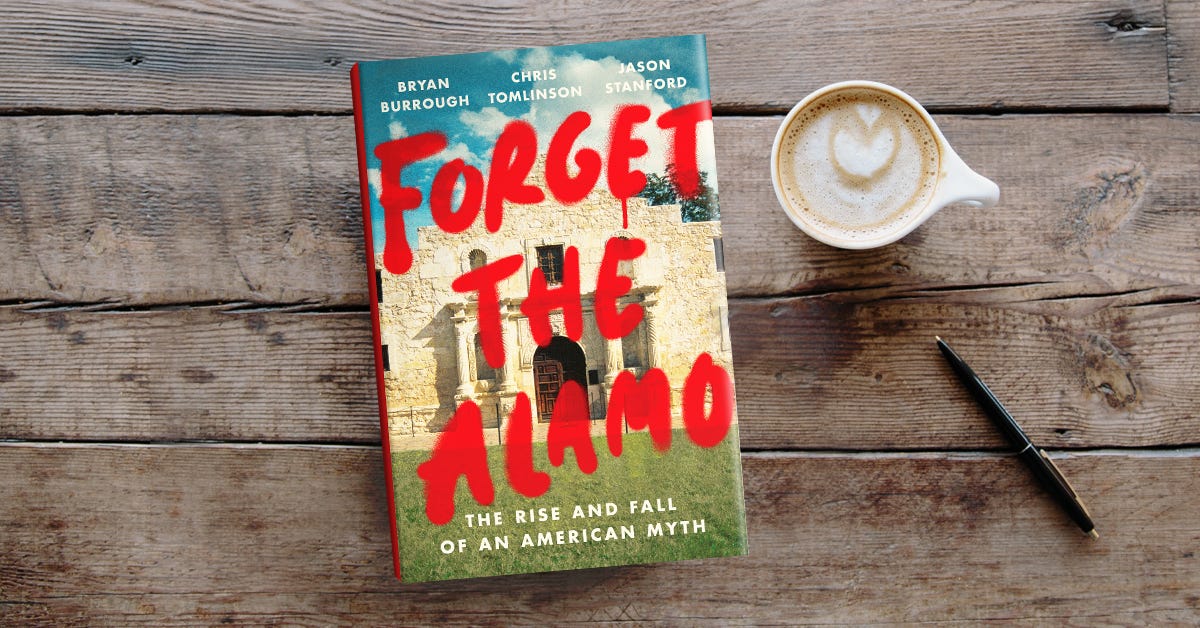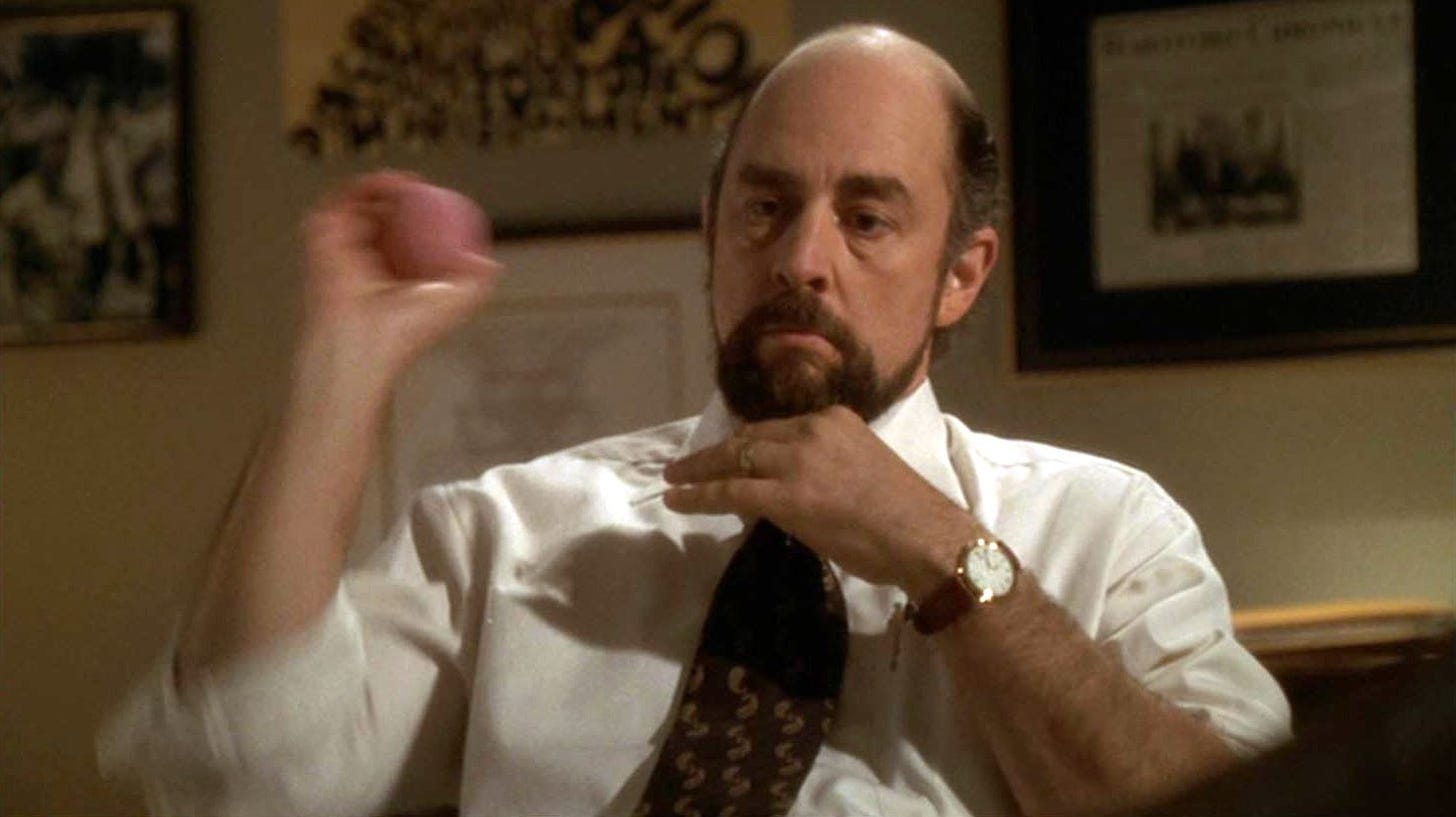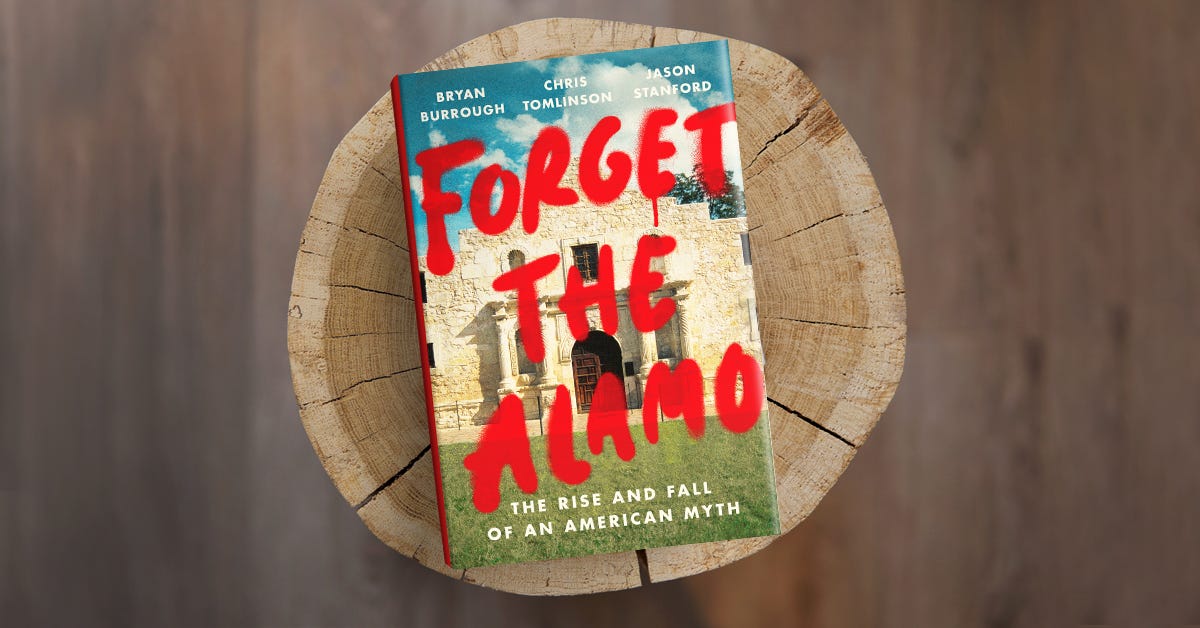Welcome to The Experiment where the first five subscribers to email penguinpressmarketing@penguinrandomhouse.com will get free copies of Forget the Alamo from the good people at Penguin (US only).
This week, Jack Hughes has a theory about why Biden sent his vice president south, and for Pride, Jill Charlotte Stanford, no relation, offers a memory of my Uncle Buddy.
As always, we offer recommendations on things to do (suggesting geographic name changes), read (me and Bryan in the Washington Post), watch (me and the boys on The Chris Voss Show), and listen to (me on Zac McCray’s excellent podcast). Forgive me; it was pub week. I look forward to offering proper recommendations soon.
But first, among the quickest to the ramparts of the Amazon reviews for Forget the Alamo is a small battalion of defenders of history’s Heroic Anglo Narrative. Forget the Alamo might be the fourth best-reviewed book of the week, but it’s getting killed on Amazon where as of this writing it has a 2.5-star average because we’re getting bombarded with 1-star reviews.
I value your time and would hate for you to slog through the reviews on Forget the Alamo’s Amazon page. So I did it for you and rank the best 1-star reviews here:
#5: Rodney Badger don’t care.
Complete and utter fictional rewrite of history to fit the narrative that the authors and many want to spew.
Can’t imagine the psychic toll that walking through life tagged with the name “Rodney Badger” takes on a fellow, but I have to take issue with his contention that we made up the history of the Texas Revolt in Forget the Alamo. We did this really mean thing by reading what they wrote and said at the time and then put it into our book. Dirty pool to take them at their own word, I know.
#4: Stephen K. accidentally I suspect, gets it exactly right.
This book’s revision of history is disgusting and the authors are morally repugnant.
Speaking for my co-authors, we also find slavery, running Tejanos off their land, and the decades of teaching Mexican-Americans that they were the bad guys in their own state disgusting. As for whether Bryan, Chris, and I are morally repugnant, guilty. I’m surprised this doesn’t come up more often.
#3: C.F. offers a confusing, if blessedly short, attack. To wit, of sorts.
The authors are far left liberals, part of the “Hate America First” crowd, hailing from leftist bastions of Washington DC and Austin, Texas. The men who fought and died at the Alamo are heroes.
Are we liberals or leftists, my good man? And we all live in Austin, but I was born in DC, so kudos on your research. But points off for lack of clarity in lumping us in with the “Hate America First” crowd. Are we hating America first, and if so, what is second, because I vote for Canada, but I need to know what the rules are. Or do you mean that we hate “America First,” the Lindbergh-era nativist brand that Trump resurrected in 2016? C.F., if those even are your initials, you obviously haven’t read your Voltaire recently. If you wish you to one-star my book, first define your terms. Am I a liberal or a leftist? Do I hail from the city of my birth or my residence since 1993? Do I, most importantly, hate fascists or my own country?
I am not surprised C.F.’s two-sentence assessment of Forget the Alamo’s merits leaves a lot of money on the table, and while I admire concision, C.F. packs too much confusion into one sentence to qualify it as pith.
#2: Kindle Customer packs a lot of confusion into two sentences, one of which was incomplete.
A couple of left wing liberals got together to write a “book” that other leftist teachers can use to help them in brainwashing America’s youth in their classrooms…
This book is nothing more than America hating trash.
Oh, c’mon, Kindle Customer, if that is your real name, it’s a lot more than “America hating trash.” Again, here we see a conflation of liberals with leftists. Good sir, we take issue.
But my biggest problem is that Kindle Customer first calls Forget the Alamo a “book,” implying that it’s not really a book, and only a sentence later outright states that it is, in fact, a book. Kudos, Kindle Customer, on this dizzying misdirection. Make up your mind, cowardly Kindle Customer. Is it a “book” or is it actually a book?
#1: Colloquialism betrays a poor understanding of the economy of authorship.
This book is very poorly written and relies on the same pseudo-logic that is uses as it’s argument… a misremembering and made up retelling of history. What this book really is, however, is yet another attempt to capitalize on another liberal agenda of trying to “rewrite” history. In the end, their evidence is circumstantial and doesn’t really change anything other than their bank accounts. Just avoid this garbage.
Here’s hoping this book changes our bank accounts! But if you’re looking to cash in on a cultural wave, here’s how not to do it: Decide three years ago over brunch that it would be fun to write a book together, give up weekends and vacations to wrestle the monster into the cage, and then divide the money up three ways. We could have made more money getting into crypto currency, whatever that is.
But if you’re going to attack our little three-year-old Forget the Alamo as “very poorly written,” first you need to learn the difference between “it’s” and “its.” Also: hyphens and however. Google them.
BONUS: Ray Thiess checks in with an evocative one-star review that posits our book’s utility in a surprising venue.
If you need extra toilet paper for a camping trip, this book works perfectly. It is the only good thing about it. These authors have hopped onto the contemporary bandwagon with little knowledge of what they’re actually writing about. They claim that the legacy of the Alamo is only in memory of white slave owners. …
From here he launches into the “some of my best Alamo friends were Black” defense, citing the presence of Amos Pollard, an abolitionist, and Samuel McCulloch Jr., a freed slave, as well as one David Crockett, who in congress stood up for Native Americans. Hundreds of pixels fall in service to a prove a point that remains obscured in inanity before he—and I’m not making this up—cites Crockett’s portrayal by both Fess Parker and John Wayne as evidence of the real Crockett’s virtue.
Finally, Thiess describes how the armed forces who seceded from Mexico combined enslaved people, Tejanos, free Blacks, European foreigners, women, and even Native Americans in what he termed “one of the most culturally mixed armies in American History.”
Now, it is true that the U.S. Army does not currently include human chattel and European foreigners and only recently allowed women to serve in any combat role, but I’m calling balderdash on the Texas Revolt being a progressive multicultural force, seeing as how the resulting constitution established the Republic of Texas as the strictest slave state in the world at the time and preceded what our book shows was a kind of an ethnic cleansing in which many of the Tejanos who fought alongside the Texians were run out of Texas. Other than that, yeah, the Alamo was one big Benetton ad.
But the real quibble I have with Thiess’ review is his notion that this book “works perfectly” as “extra toilet paper for a camping trip.” Are there, on a Thiess venture into the woods, two categories for toilet paper: regular and extra? Is the extra to be held in reserve for… what, exactly? Overflow situations? Does camping, in particular, require a heartier paper weight than when Thiess literally drops the kids at the pool?
For the sake of generosity to my fellow man, I’m assuming that Thiess refers solely to the hardcover edition and not the digital or audio versions, which if I’m wrong raises ecumenical questions I am unprepared to parse on this Sunday morning. But I conclude by asking what in particular makes Forget the Alamo “perfectly” suited to tend to Thiess’ recreational eliminations?
In the end, Thiess’ one-star assault upon the Forget the Alamo withstands as much examination as the Alamo myth did historical inquiry. Still, happy camping!
How you can help:
If you have read the book, please consider adding your 1-star review here. If you insist upon giving us a positive review, I won’t stand in your way.
Sales on opening weekend are crucial. If you’ve been meaning to buy it, now is the time. Here’s the Amazon page, and here are all the other options. And if you’re in Austin, treat yourself to a (masked) visit to BookPeople where all their copies are signed by all three of us, pictured above. From left to right, in more ways than one, are Chris, me, and Bryan.
One of the great joys of my life has been seeing you post pictures holding copies of Forget the Alamo to your friends. The more you recommend this book, the more the 1-star army of trolls will be overwhelmed by the actual book-buying public of readers. Please keep recommending the book to your friends and posting online.
Father’s Day is coming up. Amazon gift wraps.
West Wing Second Season Surprise
by Jack Hughes
Jack Hughes channels his inner Toby Ziegler this week and has a theory about why Joe Biden is sticking Kamala Harris with the immigration portfolio.
Stories of My Uncle
by Jill Charlotte Stanford
My uncle, who died in January 1987, lived a glamorous life I only saw glimpses of. He was gay, a fact most of us only found out in mid-1986 when he got sick. Occasionally, people from his past find me online and share stories of their connections with the man they knew as Scott, his first name, or Kalani, his middle name, or Uncle Buddy, the name I gave him. There was so much of him one name was not enough. For Pride, I’ll be sharing stories of the uncle I miss and a man I only thought I knew. This week, Jill Charlotte Stanford, no relation, shares a memory about the comical vanity of his hands.
How we’re getting through this
Suggesting geographic name changes
Thinking twice about following orders
Bewaring of the moral reasoning of crowds
What I’m reading
Josh Berthume: “This Person Does Not Exist” - Print this out as a must read.
"Knowing the facts doesn't help me picture the truth,” writes Green. “That's the wonder and terror of computer-generated images for me: If they look real, my brain isn't nearly sophisticated enough to understand they are not."
Bryan Burrough and Jason Stanford: “We've Been Telling the Alamo Story Wrong for Nearly 200 Years. Now It's Time to Correct the Record” - Probably the only Tim Hortons reference related to the Alamo in the history of the English language.
Imagine if the U.S. were to open interior Alaska for colonization and, for whatever reason, thousands of Canadian settlers poured in, establishing their own towns, hockey rinks and Tim Hortons stores. When the U.S. insists they follow American laws and pay American taxes, they refuse. When the government tries to collect taxes, they shoot and kill American soldiers. When law enforcement goes after the killers, the colonists, backed by Canadian financing and mercenaries, take up arms in open revolt.
Bryan Burrough and Jason Stanford: “The myth of Alamo gets the history all wrong” - We did this mean thing where we found all the things Stephen F. Austin said about slavery and put it into the newspaper.
Cotton was booming, though, which boosted illegal immigration into Texas. Americans, though still a minority, were fast on their way to becoming a majority. This demographic shift increased Mexico’s efforts to directly control Texas, including newfound enforcement of laws. Texans, accustomed to a la carte obedience to Mexican law, took this affront as tyranny.
In April 1832, the Mexican government closed a loophole allowing settlers to reclassify their human chattel as indentured servants. This finally outlawed slavery, full stop. For Austin, this was the last straw. “Texas must be a slave country,” he wrote a friend, “circumstances and unavoidable necessity compels it.”
Christopher Knowlton: “Two Books on the Bizarreness of Texas” - A good New York Times book review!
The authors of “Forget the Alamo” — Bryan Burrough, Chris Tomlinson and Jason Stanford — are friends who concocted their book’s premise during a breakfast gabfest and then managed to pull this jack rabbit out of a Stetson during the pandemic lockdown.
Deborah Paredez: “Perseverance” - bracing stuff
We've landed on the planet named after the god of war…
Bob Ruggiero: “A Trio of Texas Authors Take on the Many Myths of the Alamo” - Houston Press gives Forget the Alamo some love.
A highly engaging and lively-written work, it’s the collaboration between book author Bryan Burrough (Days of Rage, Public Enemies); author (Tomlinson Hill), former AP reporter, and Houston Chronicle/San Antonio Express-News journalist Chris Tomlinson; and journalist/former political consultant Jason Stanford.
Vanity Fair: “Davy Crockett Surrendered?! Jim Bowie, a Slave Trader?! Sam Houston, a Coke Addict?!: In their new book, Forget the Alamo, three Texans bust the myths about that famous “last stand” in San Antonio.” - Our excerpt finally ran in a magazine my aunties read.
The story of the Alamo is simple, right? Davy Crockett, Jim Bowie, William Barret Travis, and a bunch of their friends come to Texas to start new lives, suddenly realize they are being oppressed by the Mexican dictator Santa Anna, and rush off to do battle with him at an old Spanish mission in San Antonio. They are outnumbered but fight valiantly and die, to a man, buying Sam Houston enough time to defeat Santa Anna at the Battle of San Jacinto. As almost any Texan will tell you, their sacrifice turned the Alamo into the cradle of Texas liberty.
The problem is that much of what you think you know about the Alamo is wrong. What you just read? That’s the Alamo myth. The actual story, well, it’s a lot more complicated.
Nic Yeager: “‘Forget the Alamo’ Unravels a Texas History Made of Myths, or Rather, Lies” - It’s not up to people of color to debunk whiteness.
…the book provides strong, provocative critiques of U.S. imperialism and colonialism. The writers make clear that even before Mexico gained its independence from Spain in 1821, U.S. presidents and Washington insiders were invested in—and had a hand in—destabilizing the region in the hopes of eventually annexing Texas. Forget the Alamo also turns to LBJ, who once said, “Hell, Vietnam is just like the Alamo,” and suggests that the patriotic, pioneering myth of the Alamo has been used to buttress justifications for war across the globe and to the present.
What I’m watching
Bryan, Chris & I went on the Chris Voss Show to talk about the book.
Bryan & Chris also went on Fox 7’s Good Day Austin.
What I’m listening to


What do you think of today's email? I'd love to hear your thoughts, questions and feedback. I might even put ‘em in the newsletter if I don’t steal it outright.
Enjoying this newsletter? Forward to a friend! They can sign up here. Unless of course you were forwarded this email, in which case you should…
Swimsuit season’s coming. Try Noom, and you’ll quickly learn how to change your behavior and relationship with food. This app has changed my life. Click on the blue box to get 20% off. Seriously, this works.
We set up a merch table in the back where you can get T-shirts, coffee mugs, and even tote bags now. Show the world that you’re part of The Experiment.
We’ve also got a tip jar, and I promise to waste every cent you give me on having fun, because writing this newsletter for you is some
Forget the Alamo: The Rise and Fall of the American Myth by Bryan Burrough, Chris Tomlinson, and myself is out from Penguin Random House. There is no better way to support this book than to order a copy.








